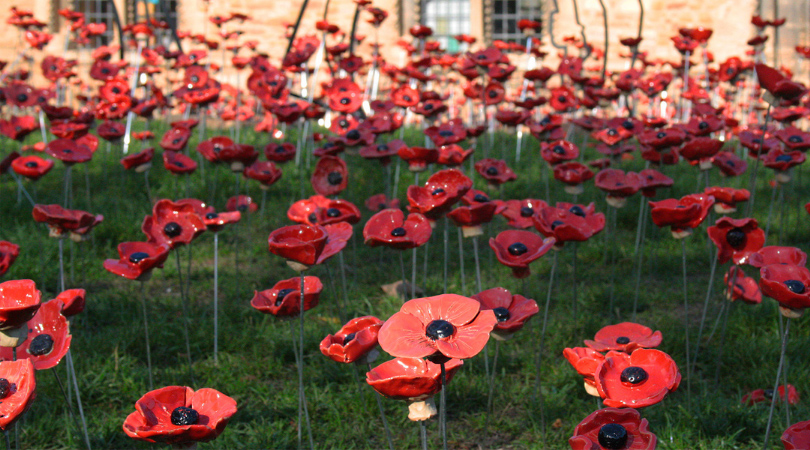When generations connect – A socially distant Remembrance Day
5 November 2020
Written bySamuel Holmes

National Office
Please enter the office location/term above to receive results for your closest office as well as information matches
Society grows great when older people plant trees under whose shade they shall never sit. (Greek proverb)
There is never a better time to think about this than on Remembrance Day, when we stop and reflect on those who have served and lost their lives in conflicts across the globe. But it doesn’t have to end there, older generations continue to contribute and enrich our lives today and influence our future. Captain Sir Tom Moore is a good example of this – a 100-year-old man who survived terrible conditions in the army during the Second World War and today contributes both to his grandchildren’s and national life – A true inspiration to us all.
Years ago, older generations were much more involved with younger people, and vice versa. But times change; families are having children later in life and are living greater distances from their parents. Add to this the fact that our lives are becoming more segregated – with accommodation for older people more often than not set apart from where younger generations live; children and grandparents are missing out on time together.
Social issues such as these seem to push the gap between generations further and further apart. Many older people, though living longer, often retiring early and being financially better off, experience loneliness, lack of purpose, and often poor health. The young too, are also at risk of loneliness and we shouldn’t underestimate how isolating leaving home for the first time or starting a new job can be. In current times, Covid-19 and its emphasis on social distancing makes both age groups even more vulnerable to becoming distant from each other. How can children and older adults alike find wellbeing, happiness and a sense of purpose in this seemingly never-ending situation?
If the internet has taught us one thing, it’s that everyone has a story – and we love to share them. So why not encourage people of different generations to connect and appreciate each other more? After all, the day-to-day sharing of personal experience and histories is known to have enormous benefits to both individuals and the wider community.
Forming friendships and sharing experience across the generations enables some really unique learning to happen. An example of this is Jack, in his nineties, showing his ten-year- old great-grandson, Daniel, some photos of him in his younger days.
“There’s pictures of someone running and a guy in hospital,” said Daniel. “That’s not you, is it?”
“Yes, it is. I was young, once too, you know! I was in the Royal Engineers and represented my regiment at running.”
“But you had a bicycle shop – “
“True, but that came later. I was in the army when I met your Great-Gran. She was in the Queen Alexandra’s Royal Army Nursing Corps – a nurse on the ward where some of those pictures were taken.”
“Wow! You got shot in the war?”
“Not shot, no. But we were building a pontoon bridge across the river Weser, in Germany. I got hurt.”
Jack went on to explain that the original bridge had been blown up and they had to build a temporary floating bridge to get troops across the river. As he described what happened he saw the astonishment in the boy’s eyes and felt a surge of pride. Daniel was seeing him as a different person and not as the old man he was now. A new warmth and appreciation seemed to have developed between them.
The Covid-19 pandemic has many similarities to wartime and even the Queen, during a rare public address, urged us to adopt the same discipline and resolve people had shown during World War II. Government enforced ‘lockdowns’ do enable the virus to be suppressed but they require individual and collective sacrifice reminiscent of wartime strain on the home front.
With a second lockdown now coming into effect today, there will be far less opportunity to meet up with the older members of our community and traditional Remembrance Sunday gatherings will also be cancelled. As difficult to accept as they may seem, the timing of the new restrictions do offer the perfect opportunity to connect with older members of our community and reflect on how to overcome challenging times.
Examples include:
For 2020, Radfield Home Care Bexhill, Hastings and Battle have joined forces with Catsfield CofE Primary and Robsack Wood Primary to organise a ‘Socially Distant Remembrance Event’. Children from each school have been invited to send in questions they would like to ask some of Radfield’s clients who lived through World War II, with the responses being recorded and shared with the schools. Radfield’s clients will also receive creative work from the children and it is hoped that the event will enable both generations to remember the fallen and reflect on how a combined national effort can overcome adversity.
If you would like to find out more about Radfield Home Care and the care support services offered, you can visit www.radfieldhomecare.co.uk or contact the branch directly on [email protected] or 01424 559 202
Get in touch with your local Radfield Home Care office today and find out more about the support we offer and the difference we can make.